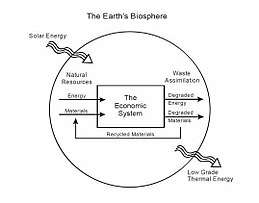Wealth, Virtual Wealth and Debt
Wealth, Virtual Wealth and Debt is a 1926 book by the Nobel prize-winning chemist Frederick Soddy on monetary policy and society and the role of energy in economic systems. Soddy criticized the focus on monetary flows in economics, arguing that real wealth was derived from the use of energy to transform materials into physical goods and services.[1] Soddy’s economic writings were largely ignored in his time, but would later be applied to the development of ecological economics in the late 20th century.[2]
| Part of a series on |
| Ecological economics |
|---|
 Humanity's economic system viewed as a subsystem of the global environment |
|
Works
|
Real wealth and virtual wealth
In this book Soddy points out the fundamental difference between real wealth (consumables such as buildings, equipment, energy, food) and virtual wealth, in the form of money and debt. Soddy contends that real wealth is subject to entropy and will rot, rust, wear out, or be consumed over time, while money and debt (as artificial accounting devices) are subject only to the laws of mathematics, not the laws of thermodynamics. As debt compounding at some rate of interest, virtual wealth will grow effortlessly over time and without limit, instead of diminishing with use as does real wealth. Soddy uses actual occurring examples to demonstrate what he considers a major flaw of prevailing economic theory.[3]
Representative quote
We thus arrive at the conclusion that any sort of perpetual motion is impossible. A continuous stream of fresh energy is necessary for the continuous working of any working system, whether animate or inanimate. Life is cyclic as regards the material substances consumed, and the same materials are used over and over again in metabolism. But as regards energy, it is unidirectional, and no continuous cyclic use of energy is even conceivable. If we have available energy, we may maintain life and produce every material requisite necessary. That is why the flow of energy should be the primary concern of economics. In a world which has adequate supplies of energy, scientific knowledge and inventions for utilising it, and the man-power able and willing to perform the necessary duties and services, poverty and destitution are purely artificial institutions, due to ignorance of the principles of government, actively, if not deliberately, fostered for class ends by legal conventions confounding wealth with debt. Under any scientific system of government they would disappear like small-pox and malaria, by means of preventive rather than ameliorative or curative measures.[4]
See also
- Bioeconomics
References
- "Archived copy". Archived from the original on 2008-11-20. Retrieved 2008-12-31.CS1 maint: archived copy as title (link)
- Eric Zencey, "Mr. Soddy’s Ecological Economy", The New York Times, Opinion Section, April 12, 2009.
- Herman Daly and Anneli Rufus (19 November 2008). "The Crisis". Adbusters. Retrieved November 8, 2014.
- Frederick Soddy Wealth, Virtual Wealth and Debt, George Allen & Unwin 1926, page 56